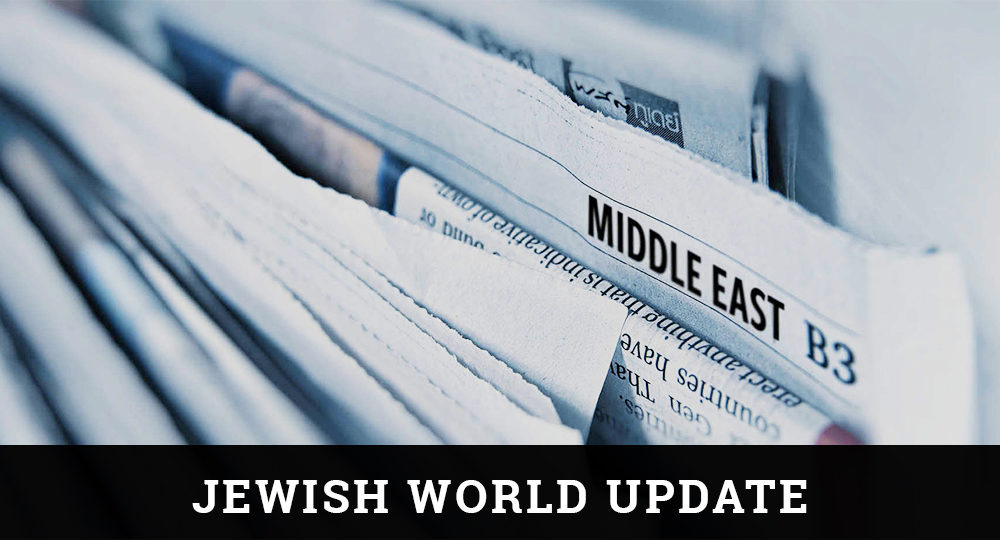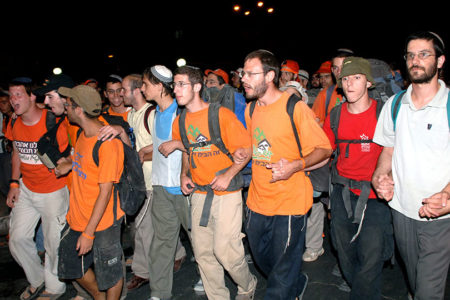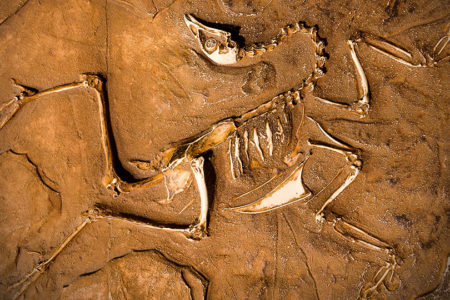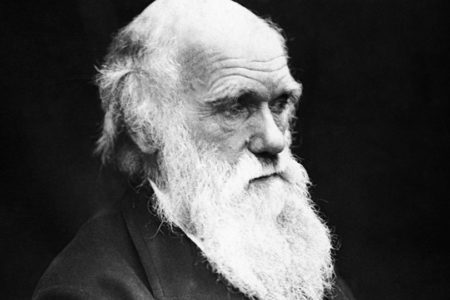Israel in the News Jul/Aug 2005
IDF Soldier a Neo-Nazi
ARUTZ-7—A non-Jewish Israel Defense Forces (IDF) soldier who immigrated to Israel from Russia has been found to belong to a neo-Nazi organization.
Police detectives searched the IDF soldier’s vehicle after they deemed his behavior suspicious. Heroin was found, and he was arrested. During his arrest, the soldier told the police officers that he was a neo-Nazi and hated the State of Israel. The 20-year-old, who serves in a noncombat position, has a swastika tattooed on his left arm.
After searching his and his mother’s home in the Samaria city of Ariel, police discovered Nazi literature and material on his computer from neo-Nazi groups around the globe. He even showed the officers personal correspondence between himself and neo-Nazi groups. He hates Jews, hates the IDF, and considers himself a Nazi, according to a police spokesman.
The soldier’s mother, who immigrated to Israel with her son four years ago, also professed support for neo-Nazi groups and hatred for Israel. She was also taken into custody for possible connection with neo-Nazi groups. “We immigrated for the absorption package,” the soldier’s mother said when challenged.
The government will consider revoking the citizenship of the two if they used fraudulent documents, but warned that such action is complicated from a legal perspective.
Teen Murdered
ARUTZ-7—Islamic Jihad terrorists executed an 18-year-old boy who helped Israel track down members of the gang. He lived in the same village where terrorists recently killed an Israeli soldier. The youth, Rami Al-Malakh, was shot to death. The execution took place near Tulkarm, one of two cities where Israel has withdrawn its forces and given the Palestinian Authority (PA) responsibility for security.
Tulkarm is east of Netanya and overlooks what used to be the 1967 border before Judea, Samaria, and Gaza were captured by Israel in the Six-Day War. Al-Aqsa Martyrs’ Brigade terrorists, affiliated with the Fatah organization, which rules the PA, and the Islamic Jihad have led the latest wave of terror against Israel.
The 450 Cows of Gush Katif
ARUTZ-7—Israel may demolish the city of Gush Katif in Jewish Gaza after it expels the residents there. There are hundreds of farms and hothouses in Gush Katif, but only one dairy farm. Its owners say they have no idea what the government plans for it.
Benny Ginzberg, the chief dairy farmer, pointed to the houses of the Arab city of Khan Yunis, several hundred meters away: “Those houses have been here since before the Six-Day War. If they wanted this land, what stopped them from spreading out to here before? We’re not bothering them; the opposite is true. When we first came, they told us that we were crazy for even trying to build something here. ‘The land is cursed,’ they told us. Well, we built something, something very great, and now our own government wants to end it all? For what? Why?”
The small force of seven Israelis is filled out by two workers from Nepal. “We started it in Purim of 2000,” Benny recounts. “It took a year and a half of preparations to get off the ground, clearing the sand dunes, planning, building the site, acquiring the cows, and the like. We started with 200 cows and now have 450—a nice growth. Our goal is to reach an output of 5 million liters of milk a year, for which we need another 50 cows. At present, we produce over 13,000 liters a day.”
“One morning we came in to find one cow dead from a direct mortar shell blast,” Yaron Nachman recounts. “All in all, several cows have been hurt by mortars.”
Government officials have shown only limited interest in trying to find a solution for the dairy. “As the dairy goes,” one said, “so go the residents in general. After all, there is no realistic option for any of us; no alternative sites are ready, and no one has any idea where or how we would live, work, or send our children to school if this plan goes through.”
“The most important thing to keep in mind,” Benny says, “is that until the Tunisians arrived [a reference to Arafat and his men, who had been running the Palestine Liberation Organization from Tunisia until the Oslo Agreement of 1993], there was peace between us. Even now, the people of Khan Yunis don’t want us to leave. They’re happy with the situation as it is.
“Sharon didn’t count on the strength and cohesion of the people here—everyone is in this together, and no one will abandon the other, and no one will give up the struggle for the People of Israel to live in the Land of Israel. We’re here!”
‘Jail Doesn’t Scare Us!’
ARUTZ-7—Among the 70,000–80,000 celebrants who came to Gush Katif for Israeli Independence Day May 12 was Tzfat’s Chief Rabbi Shmuel Eliyahu. “I myself am ready to sit in jail to stop the withdrawal plan,” he told the crowds.
Busloads of people arrived in Gush Katif throughout the day, drop-ping visitors off at various communities along the way. One resident said she drove through several towns, “and each one of them was packed with people.”
Twelve public figures from different fields were invited to address the visitors, including Rabbi Eliyahu, MK Ayoub Kara (Likud), and others. Rabbi Eliyahu called on opponents of the disengagement plan to be willing to sit in jail in the course of the struggle.
He said, “We don’t want to go to jail, but jail doesn’t scare us.” MK Kara said he would be willing to give up his Knesset tasks in order to remain with the Gush Katif residents. He and others blessed the audience and said they should be privileged to celebrate Independence Day in Gush Katif next year as well.
Both Gush Katif and Kfar Darom are scheduled to be swept clean of Jews this summer under disengagement.
Yehuda Meshi-Zahav said, “The Land of Israel is the inheritance of our forefathers and has belonged to the Nation of Israel for time immemorial. It is no one’s personal inheritance, and no one has a mandate to trade in Land of Israel territories. Don’t steal the Land of Israel from us!”
During the day a new synagogue was dedicated in Kfar Darom. The original cornerstone was laid in 1995 by none other than then-MK Ariel Sharon. Kfar Darom existed in the area during Talmudic times and was renewed some 75 years ago until it was conquered by Egypt in 1948. It was rebuilt once again after the Six-Day War, and now boasts some 70 families, as well as an elementary school, a yeshiva, and the Torah and Land Institute.
What’s Next?
Maj.-Gen. Dan Har’el predicts that danger to Israel from Arab forces in Gaza will increase after “disengagement” because the Arabs are smuggling huge quantities of weapons into Gaza.
Arutz-7 reported that the Southern District commander feels the barrages of Kassam rockets and mortar shells will extend even deeper into Israeli territory, striking more Jewish towns.
The government has allocated funds to reinforce roofs of public buildings in the region to help them withstand rocket attacks. Gaza-based attacks aimed at civilian and military targets throughout Gaza and other parts of southern Israel have increased over 300 per-cent recently.
Arab Praise For Israel
(Excerpt from an article by Daniel Pipes)
For all their rhetoric about Israel’s “vicious” and “brutal” occupation, Palestinian Arabs sometimes acknowledge they prefer Israel to the Palestinian Authority (PA).
Restraints on violence. After PA police raided the house of a Hamas supporter and roughed up both him and his 70-year-old father, the father yelled at the police, “Even the Jews did not behave like you cowards.” When the son came out of the PA jail, he declared it as much worse than Israeli prisons. An opponent of Yasser Arafat noted that Israeli soldiers “would first fire tear gas, and then fire rubber bullets, and only then shoot live ammunition,…but these Palestinian police started shooting immediately.”
Rule of law. A Gazan leader observed, “When the infighting began in Gaza, the people were happy because the Israeli Army imposed a curfew.” Musa Abu Marzouk of Hamas said, “We saw representatives of the Israeli opposition criticize [Prime Minister Ehud] Barak and they were not arrested,…but in our case the PA arrests people as the first order of business.”
Minority rights. A Palestinian Christian declared that when the Palestinian state comes into existence, “the sacred union against the Zionist enemy will die. It will be time to settle accounts. We will undergo the same as our Lebanese brothers or the Copts in Egypt. It saddens me to say so, but Israeli laws protect us.”
Freedom of expression. A lawyer living in Gaza was arrested for slander by the PA when he wrote that Palestinians should adopt Israeli standards of democracy. For his audacity, he served jail time. A prominent psychiatrist and director of the Gaza Community Mental Health Program confessed, “During the Israeli occupation, I was 100 times freer.”
Economic benefits. Palestinians who live in Israel (including Jerusalem) appreciate Israel’s economic success, social services, and many benefits. Salaries in Israel are about five times higher than in the West Bank and Gaza Strip, and Israel’s social security system has no parallel on the Palestinian side. Palestinians living outside of Israel want an economic in; when the Israeli government announced the completion of the security fence in one region, a resident of the West Bank border town of Qalqiliya reacted with revealing outrage: “We are living in a big prison.”
These comments point to some Palestinians appreciating the benefits of elections, rule of law, minority rights, freedom of speech, and a higher standard of living. In effect, they acknowledge Israel as more civilized than the PA. Amid all the PA’s political extremism and terrorism, it is good to know that a Palestinian constituency also exists for normality.
Unfortunately, it remains a furtive constituency with no political import. The time has come for decent Palestinians to make their voices heard and state that Israel’s existence is not the problem but the solution.
Used by permission of Daniel Pipes.







